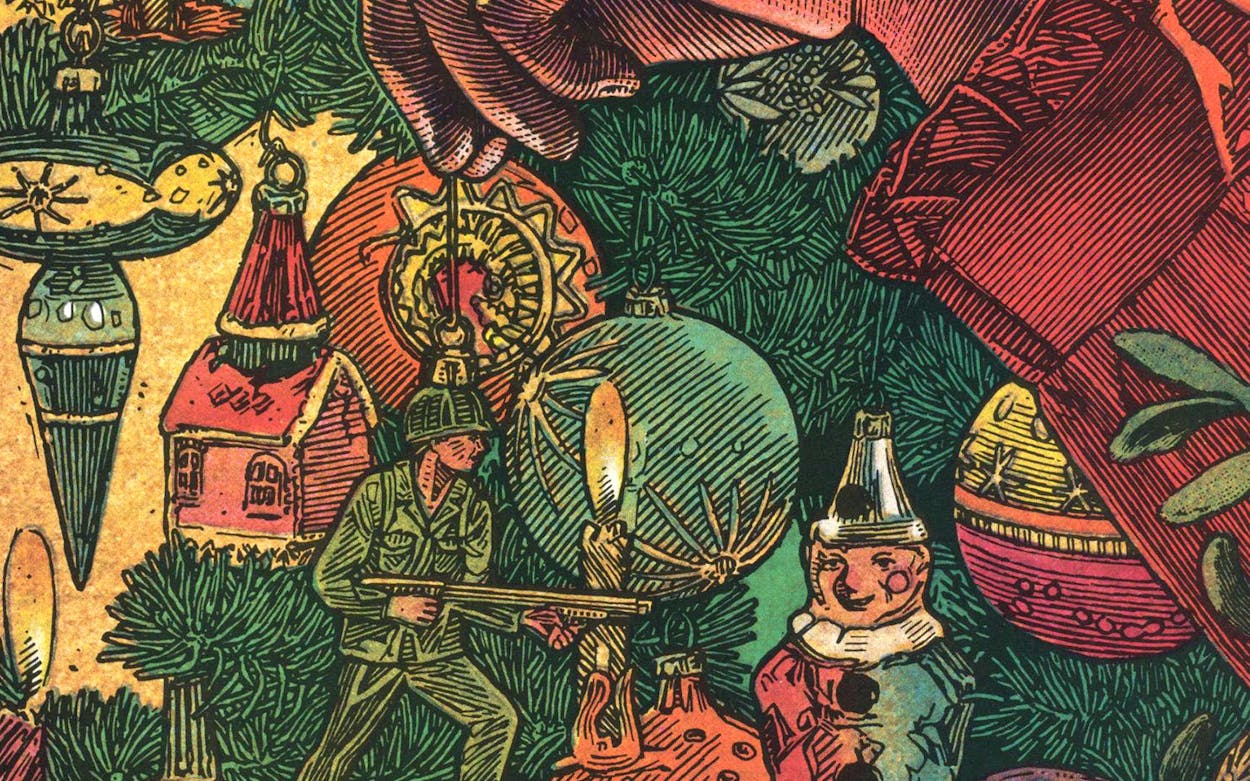I guess the news came to Clarksville in lots of different ways, but for me it came at the Avalon Theater on the square when I was twelve years old. I was at the Sunday picture show with some of my seventh-grade girlfriends. Right in the middle of the best part the sound went off and the lights came up and Mr. Wolf walked out on the stage. He said that he hated to tell us, but the Japanese had bombed Pearl Harbor.
My friends and I blinked at one another, partly because of the sudden light and partly because Mr. Wolf looked so solemn. Everyone began filing out of the theater onto the square, where the store windows were already decorated with red-and-green Christmas garlands and artificial-snow writing that said things like “We Have Your Christmas Needs!” I passed some workmen who were stringing up the colored lights around the Confederate monument as I walked home, wondering where in the world Pearl Harbor was and why it had stopped the picture show.
Mother and Daddy sat up all night listening to WFAA from Dallas, more than a hundred miles away. They talked to each other in low voices about people getting killed. Then I heard them talking about my two big brothers who were down in Austin at the university. I finally fell asleep thinking about whether we would have school the next day.
We did, but it was strange. We pulled down the big map that hung over the blackboard and pointed out Hawaii and Japan. Japan looked smaller than Texas, and Hawaii was just a speck in the ocean. We couldn’t even find Pearl Harbor. Then President Roosevelt’s voice came over the radio. I’d never listened to a radio in school before. There was a lot of static and President Roosevelt sounded far away, but when he finished speaking, we all knew we were at war.
Our teacher told us to bow our heads and say a silent prayer. I bowed my head, but I didn’t know what I should pray about. Mostly I felt confused. Finally we said amen and faced the front of the room, where the American flag and the Texas flag stood on either side of the pictures of George Washington and Stephen F. Austin. We put our hands over our hearts and said the Pledge of Allegiance. It seemed, somehow, to make everything official.
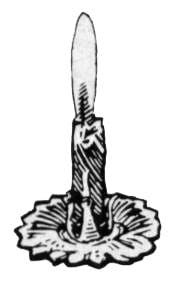
We were at war and Christmas was coming and no one knew exactly what to do about it.
We were having Christmas at Grandmother’s like we did every year. Her house was directly across Main Street from ours, on a big lot with tall elms and sycamores and pecan trees. I loved it better than any house in the world. I had spent so much time there that I felt as though it belonged to me.
Some people called the house a Texas Victorian. It had a stained-glass window in the round tower of the upstairs sitting room. And it had lots of galleries and screen porches and wide hallways, as big as rooms, where you could catch the summer breezes if any ever came. The front hall was where Grandmother liked to sit and read in her high-backed rocker. As she rocked, the light from her reading lamp sparkled on her round glasses and the “invisible” nets she bought at Duke & Ayres to wear over her thick mound of silvery hair. Grandmother sat very erect, like a queen, because she hated for people to slump.
My favorite room was the kitchen. It was bigger than ours and not so tidy. There were things on top of things and under things. And there was a big pantry that smelled like cloves and vanilla extract. Grandmother kept lots of things in the pantry—special cornmeal for her tamale pies, and flour and sugar and potatoes and sacks of pecans and black walnuts and iron pots and old darkened Clabber Girl baking powder cans that she used for steaming brown bread.
Mostly I liked the kitchen because it was always full of womenfolk. Grandmother and Mary Deavers, who helped with the cooking, and Aunt Ruth and Aunt Susie. Aunt Ruth taught school and Aunt Susie helped Grandmother with the big house, and they both lived there. After Granddaddy died and Uncle Son married and moved out, everyone said that Grandmother was lucky to have two daughters to share the big house with her. And we still had all our Christmases there.
This was to be a seven-step Christmas. I called it that because when I was little, Grandmother had shown me the seven steps leading up to her front porch, one for each of her children. I made a game of running up the steps, calling all the names out loud. The bottom step was for the youngest, Son, and the top step was for the oldest, Ben, and I knew all the ones in between according to their ages: Susie, Carrie, Ruth, Mary, and Paul. My daddy was Paul and he was next to the top step, so I said his name the loudest. But I could name them all, going up or down. And all seven of them would be home for Christmas.
Besides my aunts and uncles, lots of cousins and other relatives were coming to Clarksville for Christmas too. Grandmother had spoken for extra tables from the Presbyterian church and for folding chairs from the funeral parlor because, she said, the house was going to overflow with kinfolk and friends. And Aunt Susie had told me stories about all of them.
It seemed to me that Aunt Susie knew everyone in Clarksville and how they were related down through at least third cousins. She said Grandmother had taught her how to “count cousins” at an early age because it was important to know about the people you were kin to. I was glad I was kin to Aunt Susie, because she was so much fun and she loved Christmas as much as I did. She liked to have a touch of Christmas in every room and to make the season last as long as possible, so she always started decorating early. I was worried that things would be different this year because of Pearl Harbor. So when Aunt Susie had finished decorating, I ran over to Grandmother’s and searched through the house for all the familiar things.
The tree was up in the front hall. It nearly touched the ceiling, and it made the whole house smell like the piney woods north of town on the way to the Red River. It was strung with popcorn and cranberries and raisin-eyed gingerbread men and candy canes and icicles and little packages tied up in red and green tissue paper. All the old ornaments were there. The colored glass birds with long silvery tails glistened in the branches, and the old smiling angel in her white lighted skirt held her tarnished star at the top of the tree.
The manger scene was in place on the Baldwin grand, snowy hills of cotton batting sprinkled with Ivory flakes and glitter covering its top like always. Mary and Joseph and the Baby Jesus were in their papier-mâché stable, and painted plaster Wise Men rode their camels over the cotton hills and pointed to the tinfoil star that was hung from the ceiling by a thread.
Santa and his reindeer nestled in the magnolia leaves on the mantel of the parlor fireplace, and the gumdrop tree was there on the revolving library table. Aunt Susie made one each year out of bare bois d’arc branches from the tree in our front yard. She painted the branches silver and stuck colored gumdrops on each of the thorns. The gumdrop tree reminded me of the visions of sugarplums in “ ’Twas the night before Christmas” because I’d never figured out what else sugarplums might be.
The decorations were the same as always, but somehow the house felt different. The grown-ups were worrying about things being appropriate. They talked and talked about whether we should go caroling on Christmas Eve and what people would think if we had the fireworks on the front lawn on Christmas night like we always did. Finally they decided to carry on as usual. They said the reason was that this might be the last one, the last time everyone would be together. I guess it made them feel better to have a reason, but it sounded as though there would be no more Christmases after this year.
I couldn’t imagine not having Christmas at Grandmother’s house, but then I’d never been through a war before. I’d seen lots of pictures of war in the RKO Pathé newsreels at the Avalon, but mostly I’d giggled at the funny-looking soldiers doing goose steps. The closest I’d ever come to war was watching the National Guard drill down on the square on Tuesday nights.
Lots of people went to watch the guard drill. Mr. Erwin and Peyton West and Mr. Roy looked like real soldiers in their uniforms instead of just friends and neighbors. They barked out orders and called out cadences and made sharp, square turns all around the Confederate monument. Their boots’ striking the red brick streets frightened the purple martins that roosted in the eaves of the buildings and made them chatter and swoop wildly around the square.
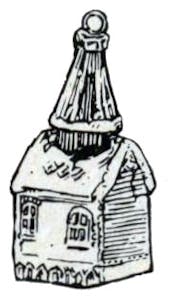
School let out the week before Christmas and my brothers, Paul Davis and Bubba, came home from the university with big appetites and lots of laundry. They talked to Mother and Daddy about Pearl Harbor, but they didn’t seem too worried. I felt a little better because I’d always trusted my brothers. They went duck hunting at the North Lake, but the weather was balmy and they didn’t get many ducks.
I spent most of my time running back and forth between our house and Grandmother’s with a cup of sugar or three eggs or a box of nutmeg or something someone needed to borrow. Everywhere I went, people were cooking or polishing or waxing things. At our house Bessie, who had been our help ever since I was born, baked an extra pan of cornbread every day to save for dressing. She picked out pecans and ground up cranberries and cut up celery. Mother made her famous date loaf and wrapped it in a damp tea towel to ripen and worried about how much boiled custard to make for so many.
At Grandmother’s, Mary Deavers washed and ironed white damask tablecloths and napkins and polished silver and cracked brown, hairy coconuts with a hammer and shredded the insides into sweet white strings for the layer cakes. Grandmother baked hams and made chess pies with thin sugar-icing tops. She shaped the butter like pineapples and stuck tiny spiked leaves from her Spanish dagger plant in the tops. Aunt Susie made orange fudge and pink and white divinity and sang, “Up on the housetop, click, click, click,” while she beat the candy. Someone was always shoving something to taste at me, a pan to scrape or a spoon to lick or a piece of raw tea-cake dough to eat.
Things were beginning to seem normal again, except that the radios were on everywhere, interrupting Ma Perkins and Stella Dallas and even One Man’s Family with war bulletins. Grandmother made everyone in the kitchen stop what they were doing and listen, but somehow by Christmas Eve, she had seen to it that all the preparations had been made.
Joy to the world!
The Lord is come!
Let earth receive her King…
The voices were clear and sharp in the night air, and I could see the white fog from everyone’s breath on each note. A blue norther had blown through on Christmas Eve, dropping the temperature thirty degrees in two hours. Even with my coat and long stockings on, I shivered with cold and excitement as we stood in Mrs. Dinwiddie’s front yard by the withered cannas and a tall clump of pampas grass.
We always sang “Silent Night” last and quieter than the other songs. When we started it, windows went up in houses across the street, and I wondered which neighbors were listening to us in the dark. I was glad that we were in perfect harmony on the last note, because we held it so long that I ran out of breath.
Mrs. Dinwiddie opened her front door. She looked very old to me, and the light behind her shone through her flannel nightgown so that I could see her thin, frail legs underneath. She wiped her eyes with a handkerchief and called out in a trembly voice, “Christmas wouldn’t be Christmas without a caroling from your family. God bless you, every one!” It made me sad, and I wondered if we would ever carol her again. Or carol anyone again now that Pearl Harbor had happened.
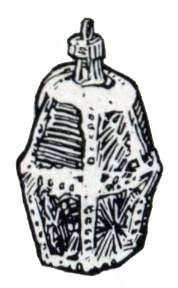
On Christmas morning I woke up with scratchy eyes, still feeling sleepy from the late-night caroling. It was daylight. I rubbed a little peephole in the frosted windowpane by my bed and touched the cold water to my eyelids. It almost never snowed in Texas on Christmas, but there was such a heavy frost on everything that I pretended it had. Through the peephole I could see Grandmother’s house, with the wreaths in the windows and smoke coming from the three chimneys. It looked like the house in the picture for December on the Gulf calendar that hung in our kitchen, only prettier.
When we got there, the house was already full of people. Everyone went around hugging each other and saying, “Christmas gift!” It was something we had always done, although I wasn’t sure just why. Then the men gathered in Granddaddy’s room, and the women went to the kitchen. And I walked through the house, looking at everyone.
In the kitchen the womenfolk were wearing cup-towel aprons and trying to shoo one another out. Someone was telling someone else to go sit in the parlor so she wouldn’t spoil her lovely new dress. “Besides,” the voice said, “you’ve done more than your part already!” But no one left.
It was loud in the kitchen with everyone talking at the same time and laughing and bumping into one another. Some were cutting cranberry salad into squares, and others were peeking under the cloths covering dozens and dozens of homemade rolls that were rising on top of the stove. Some were whipping cream for the boiled custard, and others were bringing gravy to a simmer. Someone yelled for the door to the side porch to be opened a crack because it was too hot, and someone else yelled not to do that because the cold draft might make the rolls fall. I looked for Grandmother in all the confusion. Finally I spotted her sitting at the kitchen table, erect as always, carving turkey and putting big mounds of white and dark meat on separate platters. She didn’t seem to notice all the people running back and forth around her. But someone noticed me and shooed me out, so I went up the front hall and stood by the door to Granddaddy’s room.
The men were there, having their toddies, and they were all talking too. One group was discussing who had the best bird dog and how many quail you could take on a covey rise and whether they had killed enough birds to have a quail supper. Another group was circled around Cousin Burton from Texarkana. He was telling a story in his long, slow drawl. I couldn’t hear much of the story, but when he finished telling it, the men in the circle doubled up laughing and Cousin Burton started right in on another one.
Daddy and Uncle Ben and Cousin Charlie were talking about the war. They were standing in front of the fireplace, saying things about President Roosevelt and Mr. Churchill and the Pacific and Germany and how there was only one front to fight in 1917. I didn’t understand it all, but they looked so serious that I inched my way closer to hear better.
Uncle Ben put his hand on Daddy’s shoulder and said, “Paul, it’s going to be a different year for us. I have daughters, but you have sons. It’s the sons, the men of this family, that we have to rely on to get this job done. Have you thought that some of the men standing in here right now may not be here next year?” Daddy lowered his head and said under his breath, “Yes, I’ve thought about it.”
So I started thinking about it too.
I was afraid that Uncle Ben meant my brothers, and I tried to imagine what Paul Davis and Bubba would look like in uniforms and how far away from Clarksville they would have to go. Maybe some of my uncles and cousins would have to go away too. I wasn’t certain which ones would be chosen. I only knew that I didn’t want any of them to go. Then Aunt Ruth came to the door and announced that dinner was ready and it was time for the gentlemen to join the ladies in the dining room.
We found our names on the place cards that Aunt Susie had made out of pinecones. The grown-ups were in the big dining room and the younger ones at the tables in the front hall. There was a discussion about who should say grace, and when no one could decide, Aunt Ruth said we would sing “Silent Night” instead. So Aunt Mary played the piano and everyone sang. Practically everyone cried, even some of the men. It made me feel uneasy to see men crying, and when I saw tears in my daddy’s eyes, I turned my head away.
I was awfully glad when we sat down to eat, because it got noisy again. Glasses and silverware clinked and rattled, and for a long time everyone told everyone else how delicious everything was. Then Mary Deavers and Bessie began clearing the tables and bringing in the desserts, and loud groans went up in unison. We chose from fresh coconut cake, boiled custard, chess pie, date loaf, and Nesselrode pudding. Some took two because they couldn’t make up their minds.
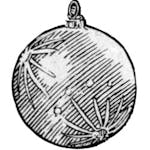
The afternoon went by more slowly than other Christmas afternoons, when the young cousins had played games of Murder in the back bedroom and Daddy and Uncle Ben and Cousin Charlie had dressed up in crazy costumes and women’s clothes and acted out grand opera in the parlor. Uncle Ben was always the soprano who drank the hemlock and took ten minutes to die while we all laughed until we were sick. Most of the cousins were grown-ups themselves now, and no one felt like acting out grand opera. In spite of how hard everyone tried, Christmas was different this year. When people started laughing too much, others looked at them until they stopped, like people who get caught laughing in church. I knew it must be because of Pearl Harbor.
When dark finally came, everyone got coats and sweaters from the pile on the bed in the middle room and went outside. The men went into the yard to get the fireworks started, and the women stood on the front gallery shivering and calling out to them to be careful.
The skyrockets went off first. They zoomed up into the night, exploding in a shower of color over the black sky. Pinwheels whirled down the long front walk, and firecrackers went off in the yard. I set off ladyfingers and listened to the quick, dainty pop-pops. Then some of us stood in a line and shot Roman candles over West Main street. Phfff-thump! Pink. Phfff-thump! Green. Phfff-thump! Blue.
The skyrocket with the little toy man in a parachute was last. Up, up, up it went in a shower of sparks until the final burst of color. Everyone clapped as the parachute floated down slowly, barely missing the roof. Then everything was quiet.
It was over. Christmas was over. But maybe more than Christmas. Something else was over too, but I wasn’t sure just what it was. I was cold and a little afraid. I wanted things to stay the same, but I could feel them changing.
Everyone started back inside, except for me and Grandmother. She stood on the front gallery for a few minutes, and I wondered what she was thinking. Then she turned away slowly and went inside. I was alone in Grandmother’s yard with my last sparkler and a stubby piece of punk that would soon burn out. I touched the punk to the sparkler and watched it sputter and glow orange on the end for a second before the sparks began to shoot out.
I twirled the sparkler like a baton. I pitched it high into the black night and watched it fall to the ground. Then I picked it up and wrote my name in the Christmas sky. Once, twice, nearly three times, before it fizzled out and died.
- More About:
- Texas History

